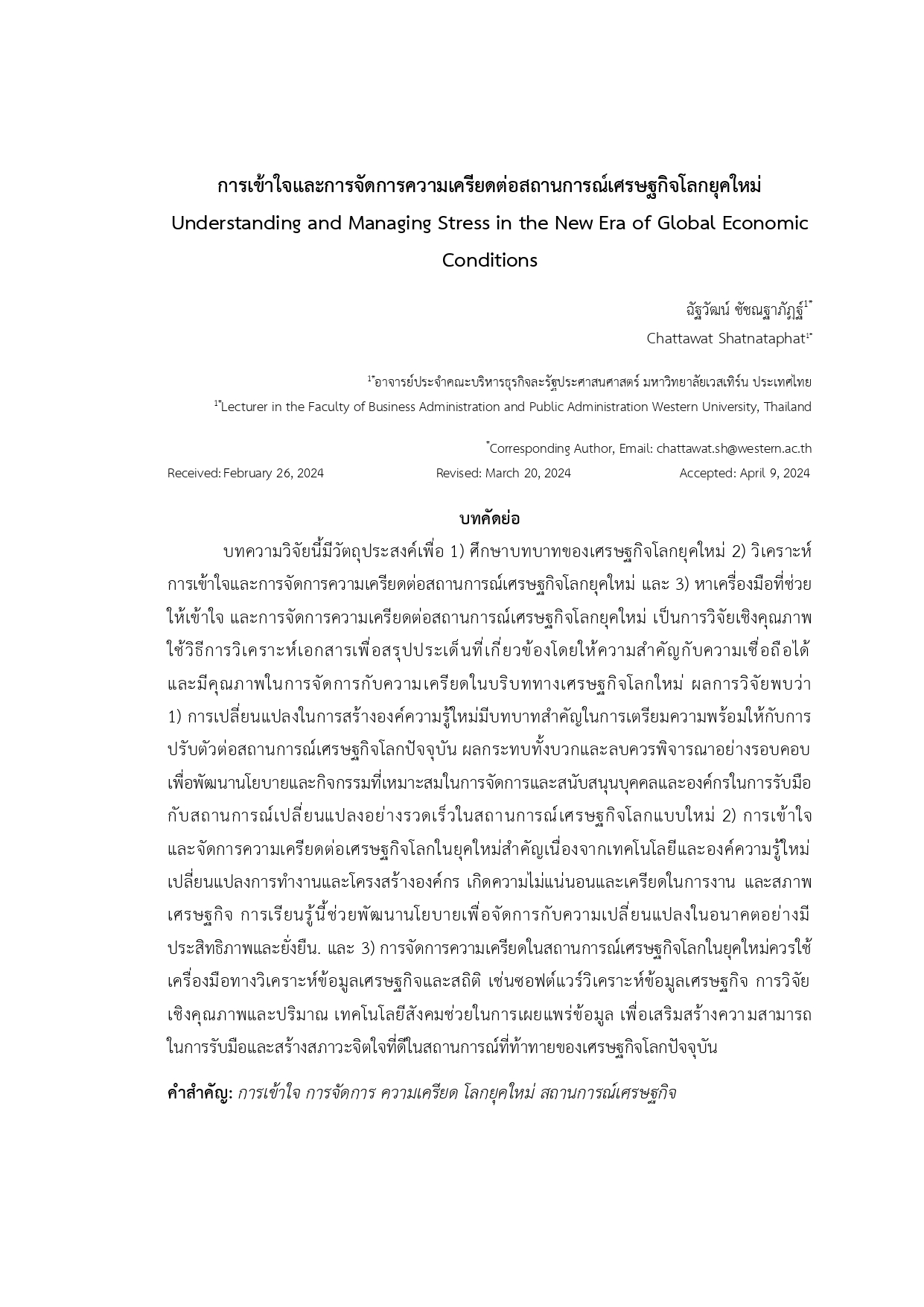Understanding and Managing Stress in the New Era of Global Economic Conditions
Keywords:
understanding dynamics, management insight, stress mastery, new age realities, economic landscapeAbstract
This research aimed to: 1) explore the role of the new global economy, 2) analyze the understanding and management of stress in the context of the new global economy, and 3) identify tools to aid in understanding and managing stress in the new global economic context. It employed qualitative research methods, analyzing documents to highlight relevant issues with credibility and quality in managing stress within the economic context. The findings revealed that: 1) Changes in knowledge creation play a crucial role in preparing for economic adaptation, leading to both new opportunities and concerns. Adaptation to technological changes results in instability and increased competition in the labor market, necessitating consideration of both positive and negative impacts to develop suitable policies and activities for rapidly changing economic situations. 2) Understanding and managing stress in the new global economic era involve multiple factors affecting individual and organizational adaptation, driven by technological and economic changes leading to income and job insecurity, necessitating organizational adjustments. This study is significant for policy development and management guidelines to cope with uncertainty and appropriate changes in the future, and 3) Managing stress in the new global economic situation should utilize analytical tools such as economic data analysis software and qualitative and quantitative research, with social technology aiding in data dissemination, to enhance coping abilities and foster positive mental states in the challenging economic circumstances of today's world.
References
Bank for International Settlements. (2022). Promoting global monetary and financial stability. Annual Economic June 2022 Report. https://www.bis.org/publ/ arpdf/ar2022e.pdf
Bekkers, E., & Schroeter, S. (2020). An economic analysis of the Us-China trade conflict. World Trade Organization Economic Research and Statistics Division.
Bowen, G. A. (2009). Document analysis as a qualitative research method. https://www.researchgate.net/publication/240807798_Document_Analy
sis_as_a_Qualitative_Research_Method
Halkos, G. (2012). Analysing the Greek renewable energy sector: A data envelopment analysis approach. Renewable and Sustainable Energy Reviews, 16(5), 2884-2893.
Jalilvand, S. B., & Ahmadi, S. (2023). The effectiveness of mentalization-based treatment on mindfulness and perceived social support in adolescents. Journal Mental Health Clin Psychol, 7(2), 16-23.
Khan, H. S. u. d. et al. (2023). The role of knowledge sharing and creative self-efficacy on the self-leadership and innovative work behaviour relationship. Journal of Innovation & Knowledge, 8(4), 100441.
Koopmans, L. et al. (2016). Cross-cultural adaptation of the individual work performance questionnaire. Journal Work, 53(3), 609-619.
Maier, H. R. et al., (2016). An uncertain future, deep uncertainty, scenarios, robustness and adaptation: How do they fit together. Environmental Modelling and Software, 81, 154-164. https://doi 10.1016/j.envsoft.2016.03.014.
Mullan, P. (2020). Beyond confrontation: Globalists, nationalists and their discontents. Emerald Publishing Limited. https://doi.org/10.1108/978-1-83982-560-620200017
Prasad, E. (2004). China’s growth and integration into the world economy: Prospects and challenges. https://www.imf.org/external/pubs/ft/op/232/op232.pdf
Rodrik, D. (2013). The past, present, and future of economic growth. https://drodrik.scholar.harvard.edu/files/dani-rodrik/files/gcf_rodrik-working-paper-1_-6-24-13.pdf
Roztocki, N., Soja, P., & Weistroffer, H. R. (2019). The role of information and communication technologies in socioeconomic development: towards a multi-dimensional framework. Information Technology for Development, 25(2), 171-183. https://www.tandfonline.com/doi/full/10.1080/02681102.2019.1596654
Sanchez-Gomez, M., Giorgi, G., Finstad, G. L., Alessio, F., Ariza-Montes, A., Arcangeli, G., & Mucci, N. (2021). Economic stress at work: Its impact over absenteeism and innovation. https://www.ncbi.nlm.nih.gov/pmc/articles/PMC8156033/
Shafiq, N. (2010). The effect of an economic crisis on educational outcomes: An economic framework and review of the evidence. Effect of an Economic Crisis on Educational Outcomes, 12(2), 5-13.
U.S. Department of the Treasury. (2023). The U.S. economy in global context. https://home.treasury.gov/news/featured-stories/the-us-economy-in-global-context
Udell, G. G. (1990). Are business incubators really creating new jobs by creating new business and new products. Journal of Product Innovation Management, 7(2), 108-122.
United Nations World Tourism Organization. (2023). World economic situation and prospects 2023. https://unctad.org/system/files/official-document/ wesp2023_en.pdf
Ustinova, O. I. (2014). Components of the human body environmental preparedness for adaptation. Literature review. Life Science Journal, 11(11), 433-437.
Viseu, J. et al. (2020). Relationship between economic stress factors and stress, anxiety, and depression: Moderating role of social support. Psychiatry Research, 268, 102-107. https://www.sciencedirect.com/science/article/abs/pii/S0165178117319339
Watson, K., McGowan, P., & Cunningham, J. A. (2018). An exploration of the business plan competition as a methodology for effective nascent entrepreneurial learning. International Journal of Entrepreneurial Behavior & Research, 24(1), 121-146.

Additional Files
Published
How to Cite
Issue
Section
License
Copyright (c) 2025 Journal of Humanities and Social Sciences Nakhon Pathom Rajabhat University

This work is licensed under a Creative Commons Attribution-NonCommercial-NoDerivatives 4.0 International License.
Journal of Humanities and Social Sciences Nakhon Pathom Rajabhat University





